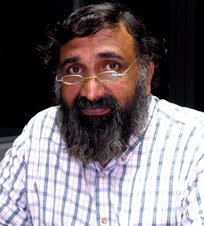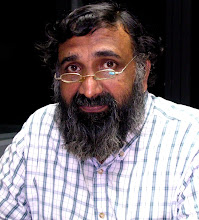My regular blog is at chithariyachinthakal.blogspot.com. I thought of starting a new blog just to write about Freedom in general and Free Software in particular. So, here it is.
This is the editorial I wrote for the magazine Science India for the issue dated November 2002. (I was editing the magazine for a short while.) This is equally relevant today, though I would have made a few small changes if I wrote it now. These changes are given at the end. I thought this was a very good article to start this blog. Hope you like this.
Ayurveda is the science of living a healthy life, developed and propagated by ancient Indian sages like Susrutha, Charaka and scores of others. It was not just about how to cure illnesses, but also about how to live in a manner that helps the body to retain its health. As such, it was knowledge useful to everyone, in fact, required knowledge for everyone.
Ayurveda made use of plant and other material commonly available in most places. It is said that hardly any plant in the world is devoid of medicinal properties. There is the story about an unusual test given to his students by a teacher of Ayurveda: he used to ask his pupils to go into the open world and return with the first plant they find that is of no medicinal value. Only those who returned empty handed qualified to pass.
Traditionally, practitioners of Ayurveda used to give prescriptions explaining the method of preparation of the medicines to be used by the patient. It is believed that ayurvedic medicines are more effective when freshly prepared. Only when people, especially in the urban areas, found it difficult to obtain the necessary ingredients and go through the cumbersome procedures involved in preparing the medicines, did ready-made medicines become popular. Even today there are ayurvedic physicians who recommend that freshly prepared medicines be used, when possible. There never was any restriction on the right to prepare medicines. Naturally, when the preparation is done by the near and dear of the patient, they would take special care to ensure quality. There was no need for any brand name to 'ensure' quality. There was no IPR. The only restriction was that knowledge would be given only to those who deserve it. One of the conditions used to be, and even today is in many tribal communities, that the knowledge acquired would be used only for helping others, not for one's own gain.
Look how things have changed with the introduction of the patent regime and IPR. Knowledge has now become a commodity to be carefully marketed to maximise one's own benefits. Even life saving drugs are not allowed to be manufactured freely for fear that the benefits that should accrue to a few individuals would diminish. Knowledge today has become a means of exploitation. And restrictive regimes like the IPR only help the exploiters.
There is a close parallel in the case of something as modern as computer software. There was a time when programs for running on computers used to be written by people wo work on computers, and they used to freely exchange these programs, thus saving a lot of work in each individual programmer rewriting them. With software companies restricting the use and exchange of program codes, this freedom was gradually eroded, until companies started taking legal action against users who dared to go against their licensing norms. This was when the movement against restrictions in software began and the Free Software Foundation was established by Richard Stallman and others. Today the world is moving towards software freedom, although laws favouring proprietary software still exist in most countries.
IPR and other restrictive regimes help a few people to exploit the vast majority. And they use the knowledge they have carefully preserved to achieve this. The only means of countering this is by the widespread dissemination of knowledge, without any restriction. The software community started doing this through the GNU General Public Licence. The scientific community already has made a few steps in this direction. Images taken by astronomical telescopes are made available over the Internet after one year. At least a few journals have started putting their articles for free download after a specific duration. Some of the popular magazines like Scientific American and New Scientist make available a part of their material for free download over the Internet. There are two free web-based encyclopedias, www.nupedia.org and www.wikipedia.org.
The only way to counter the threat of IPR, and stop exploitation through knowledge, is to make our knowledge freely available for anyone to use. But for that, we have to forgo the benefits that exploitation through IPR could bring us. After all, our society has survived with this kind of freedom for centuries and even today there are many who make a living out of Ayurvea. IPR does protect the intellectual heritage of societies, so that no one can patent any Ayurvedic medicine. Let us put out all knowledge related to Ayurveda on the Web. Let those who want to make the medicines themselves do so. Let those who want to make and sell them do so. Let Ayurveda flourish, and IPR perish.
I would make a few small changes if I wrote this today. For instance, www.nupedia.org is no more. The advent of wikipedia has made it redundant and obsolete. I would mention the movements for making scientific publications freely available, like www.plos.org and the Open Access Movement. I would also mention how journals are now moving towards making their articles available for free download, and also how the Creative Commons has made it possible for people to allow their creative works to be used by society without excessive controls. These indicate how the movement for freedom is gaining ground. Let us hope this movement ultimately succeeds in brining knowledge back into the public domain.
Subscribe to:
Post Comments (Atom)


1 comment:
Dear Sasi Kumar,
Recent raid by Microsoft to catch the piracy has triggered panic in many small computer hardware firms and training institute. Many of them has decided to insists licensed version of Microsoft O S to be purchased along with the computer.
For them delivering an assembled computer with linux installation seems to be a nightmare - they says customer come back to them for driver issues for existing or new hardware purchased later.
Since this group of petty sellers of hardware is organized in Kerala , FSF Kerala can start colloboration with them and launch a portal to solve such issues. The portal should be uploaded with linux drivers for new hardware marketed by those petty vendors. It should say whether a new hardware version is linux-ready or not.
May be this can evolve into a mechanism to push the hardware vendors to develop driver for linux or cooperate with FSF in developing the drivers.
Post a Comment